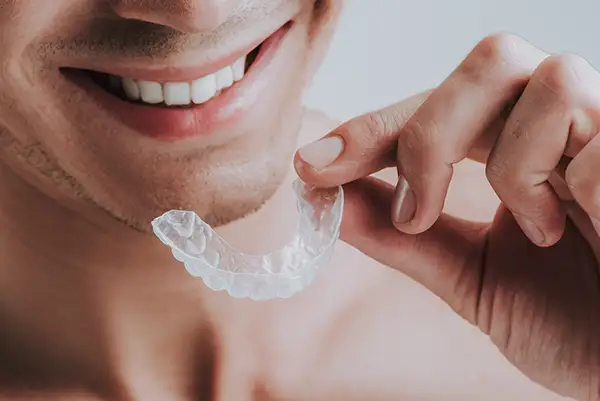
Mouth Guards Have you been waking up feeling fatigued due to snoring during your sleep? If you are also experiencing soreness and pain in your jaw, you might be in need of wearing a nightguard while you sleep. Patients that grind their teeth at night have these types of symptoms which can be relieved from wearing a night guard. Have you been waking up feeling fatigued due to snoring during your sleep? If you are also experiencing soreness and pain in your jaw, you might be in need of wearing a nightguard while you sleep. Patients that grind their teeth at night have these types of symptoms which can be relieved from wearing a night guard. Our professionals at Osborne Dentistry can diagnose a wide variety of oral health conditions related to the above symptoms and develop a custom treatment plan for you, which may include a mouthguard. These mouthguards look similar to sports mouthguards but are specially designed for certain medical conditions. Who Needs a Nighttime Mouthguard?Nighttime mouthguards are most often used to treat bruxism, or teeth grinding. If this condition is severe or persistent, it can result in wear on your teeth and also jaw pain. A nighttime mouthguard designed to protect you from bruxism will serve as a barrier between your upper and lower teeth. The other condition that has successfully been treated with a mouthguard is obstructive sleep apnea (OSA). This type of apnea involves interruptions in your breathing during your sleep cycle as a result of the support muscles in your oral cavity relaxing. This improper relaxation of the muscles causes your airway to become obstructed by either the walls of your mouth or your tongue. Nighttime mouthguards for OSA protect you from this event by adjusting the positioning of your jaw in order to help protect your airway. Some styles of nighttime mouthguards will also include a cross-section that prevents your tongue from interfering with your airway. How Long Do Nighttime Mouthguards Last?The lifespan of these mouthguards will depend largely on which condition they are treating. If it is being used to treat bruxism, then the severity of your teeth grinding will influence the longevity of the guard as well. In severe cases of bruxism, the mouthguards can last as little as six months, whereas they can last several years in milder cases. Mouthguards being used to treat sleep apnea should be replaced when you begin to notice signs of wear and tear. For most patients, this will occur every two to three years. You can also bring the mouthpiece in with you for your regular cleanings and allow our professionals to examine them at this time. Failing to replace your mouthpiece when they begin to wear can result in them failing to properly protect your airway. How Long Should I Wear It?Nighttime mouthguards will generally need to be worn on a continuing basis for persistent symptom relief. With that said, most patients find them extremely comfortable after the first few nights. Our team makes every effort to provide you with a precise fit to ensure that you have the best results from your nighttime mouthguard. These mouthguards are also portable and easy to take with you, which is very helpful if you travel frequently. If you are ready to achieve a better night's sleep and wake up without nagging jaw pain, then it is time to come see us at Osborne Dentistry and find out if you would benefit from a nighttime mouthguard. You can schedule your appointment by calling our office at 541-451-4300. |